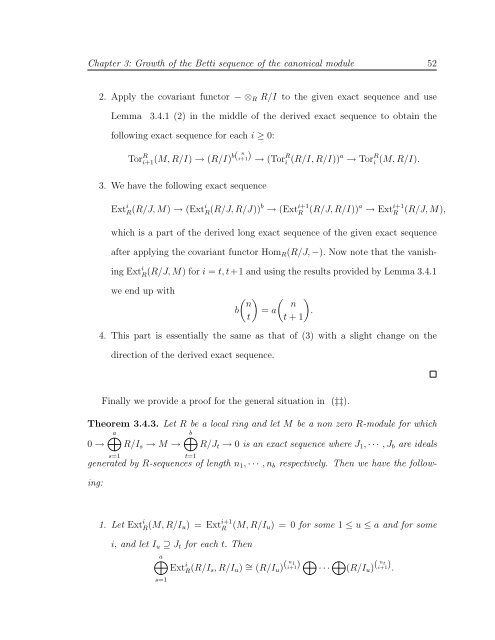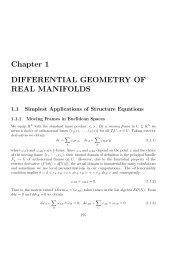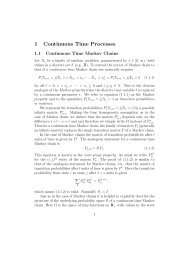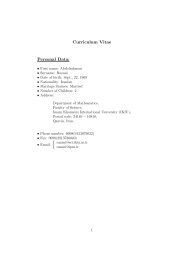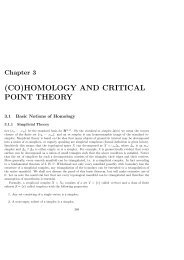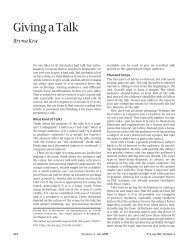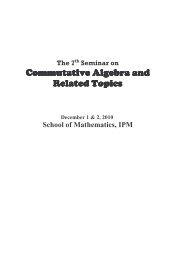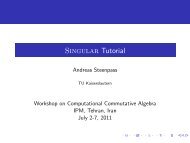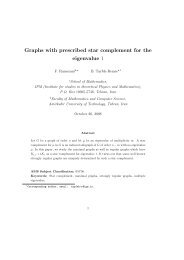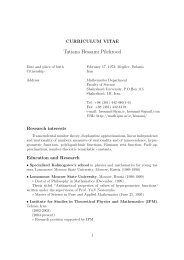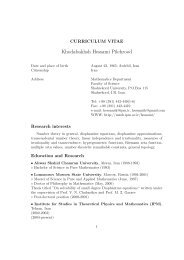Betti numbers of modules over Noetherian rings with ... - IPM
Betti numbers of modules over Noetherian rings with ... - IPM
Betti numbers of modules over Noetherian rings with ... - IPM
You also want an ePaper? Increase the reach of your titles
YUMPU automatically turns print PDFs into web optimized ePapers that Google loves.
Chapter 3: Growth <strong>of</strong> the <strong>Betti</strong> sequence <strong>of</strong> the canonical module 52<br />
2. Apply the covariant functor − ⊗R R/I to the given exact sequence and use<br />
Lemma 3.4.1 (2) in the middle <strong>of</strong> the derived exact sequence to obtain the<br />
following exact sequence for each i ≥ 0:<br />
Tor R n<br />
i+1(M, R/I) → (R/I)<br />
b( i+1) R<br />
→ (Tori (R/I, R/I)) a → Tor R i (M, R/I).<br />
3. We have the following exact sequence<br />
Ext i R(R/J, M) → (Ext i R(R/J, R/J)) b → (Ext i+1<br />
R (R/J, R/I))a → Ext i+1<br />
R<br />
(R/J, M),<br />
which is a part <strong>of</strong> the derived long exact sequence <strong>of</strong> the given exact sequence<br />
after applying the covariant functor HomR(R/J, −). Now note that the vanish-<br />
ing Ext i R(R/J, M) for i = t, t+1 and using the results provided by Lemma 3.4.1<br />
we end up <strong>with</strong><br />
<br />
n<br />
b<br />
t<br />
<br />
n<br />
= a .<br />
t + 1<br />
4. This part is essentially the same as that <strong>of</strong> (3) <strong>with</strong> a slight change on the<br />
direction <strong>of</strong> the derived exact sequence.<br />
Finally we provide a pro<strong>of</strong> for the general situation in (‡‡).<br />
Theorem 3.4.3. Let R be a local ring and let M be a non zero R-module for which<br />
a<br />
b<br />
0 → R/Is → M → R/Jt → 0 is an exact sequence where J1, · · · , Jb are ideals<br />
s=1<br />
t=1<br />
generated by R-sequences <strong>of</strong> length n1, · · · , nb respectively. Then we have the follow-<br />
ing:<br />
1. Let Ext i R(M, R/Iu) = Ext i+1<br />
R (M, R/Iu) = 0 for some 1 ≤ u ≤ a and for some<br />
i, and let Iu ⊇ Jt for each t. Then<br />
a<br />
s=1<br />
Ext i<br />
R(R/Is, R/Iu) ∼ = (R/Iu) ( n1 i+1) · · · (R/Iu) ( nt i+1) .


